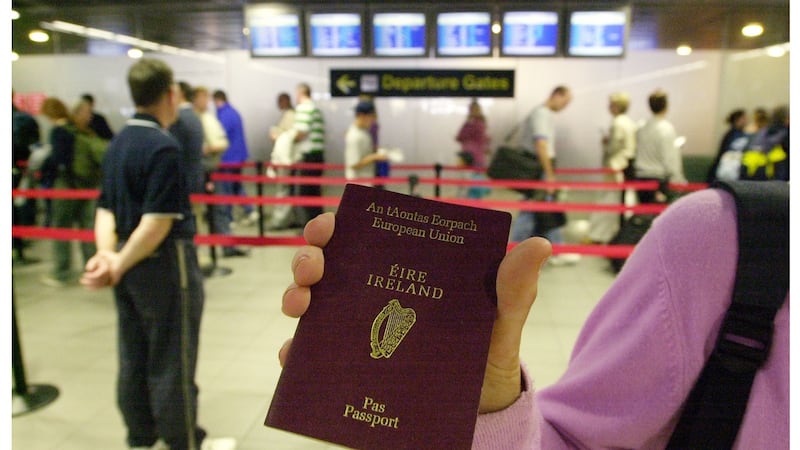Catherine O’Donnell and James Monaghan were always together.
Mother and son were “always side by side,” the parish priest, Father John Joe Duffy, told mourners at their joint Requiem Mass in Creeslough on Wednesday afternoon.
Inseparable in life, on Friday they died together as they waited in the queue for the post office inside the Applegreen service station in the village, caught up in an explosion which killed 10 people.
Their funeral was the third at St Michael’s church in Creeslough in two days, and there are more to come.
RM Block
Just as local people have gone from wake to wake, now they go from funeral to funeral; many of those present had already attended those for Jessica Gallagher, Martin McGill and James O’Flaherty – and they will be at those still to come.
Also represented at each funeral have been the emergency services, including those from Northern Ireland, local politicians, and the Taoiseach’s aide-de-camp. The President was present in person for the first time at Wednesday’s funerals, and expressed his condolences to the families of the deceased inside the church.

Yet there are also new, younger faces, including James’s classmates and fellow students from Mulroy College in Milford, which lost two of its pupils – 13-year-old James and 14-year-old Leona Harper – whose funeral will take place on Thursday.
In their dark blue and grey uniforms, they formed a guard of honour along the path to the church, waiting in silence for the arrival of their friend and his mother.
As the hearses drew up outside the church, mother and son were again side by side. The identical coffins were lifted out simultaneously; “Daughter” read the floral tribute placed alongside Catherine, while James’s read “son”.
Their coffins were brought into the church; viewed from the back of the crowd of mourners, it appeared as if they were being carried along on a sea of heads, or simply held aloft by the community, just as their families have been since the tragedy.
At this funeral, as at others, Fr Duffy emphasised their gratitude to all those who had helped in the search and rescue effort, and in the days since, not least the mortuary staff at Letterkenny General Hospital, who he said had “worked through the night” so that loved ones could go home to their families as quickly as possible.
There were special condolences, too, for family members, including Catherine’s daughter and James’s sister, Sinead, her mother and James’s grandmother Margaret, for her partner Charlie Flood, James’s father Chris, and her baby daughter, Paige, who predeceased her mother and brother.
Inside the church the two coffins were placed beside each other, smiling photographs set on each; the symbols of their lives which were brought up to the altar included items to represent the wrestling that “James loved so much” and a watch and a necklace representing the “style that was so important” to Catherine.
James, Fr Duffy said in his homily, was “full of devilment . . . full of life and joy” but also an “innocence which was very endearing . . . he was full of life, vitality, brought a smile to everyone’s face”. He loved talking and loved wrestling, so much so that as an eight-year-old he challenged another parish priest, Fr Paddy Dunne, to a wrestling match.
“Fr Dunne eventually went to a toy store and bought him a wrestling belt, and he was very proud of that.”
His mother, 39-year-old Catherine, was “bubbly, full of life, very intelligent, loved parties, loved organising parties”. She was, said Fr Duffy, “a glam lady” who loved shopping and who recently had stayed up for hours online to make sure she got tickets to see Garth Brooks.
Yet, for all the happy memories of Catherine and James which were shared with mourners, there was also the sense that – as so often since the tragedy on Friday – there was simply no way to express the depth of loss felt by both individual families and the wider community.
“Words are inadequate to express the feelings of any one of us here,” said Fr Duffy.
James, he said, had been confirmed in this same church only two years previously; the priest compared him to an aeroplane which was “slowly taxiing down the runway . . . about to take off into his teenage years” and there had been “much debate” between him and his mother about “getting to his first disco” recently.
“He was just about to launch into life,” he said. “It is no wonder, under such circumstances, that words fail us this afternoon.”

The wake, he said, reminded him of Seamus Heaney’s poem Mid-Term Break. “It was very much a scene like that,” Fr Duffy said. “The father crying.”
For the families who had lost loved ones, he said, “it was the hardest blow, and for those who continue to remain seriously ill and all who were affected by this. It is incomprehensible.”
As the Mass ended, the coffins were brought from the church and placed in the hearses, still side by side.
Catherine left first, leading the way for her son as they travelled their final few miles to the nearby Doe cemetery.
They were laid to rest in the family plot along with Paige; mother and son, always together.



















